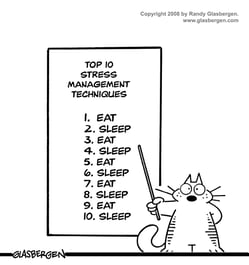 Millennials can balance school, work, financial obligations, and relationships - and the sleep deprivation that comes along with it. But this multitasking generation, who can text while doing pretty much anything, will struggle with stress management…even more than Baby Boomers, according to statistics we collected with our Coping Skills Assessment (COSA). Our research shows that Millennials are more likely to use unhealthy and unproductive techniques to cope with stress.
Millennials can balance school, work, financial obligations, and relationships - and the sleep deprivation that comes along with it. But this multitasking generation, who can text while doing pretty much anything, will struggle with stress management…even more than Baby Boomers, according to statistics we collected with our Coping Skills Assessment (COSA). Our research shows that Millennials are more likely to use unhealthy and unproductive techniques to cope with stress.
Here’s how Millennials, Generation X, and Baby Boomers compare in their approach to stress management:
(Note: Scores range from 0 to 100. The higher the score, the more often the coping method is used by a particular cohort.).

Healthy coping strategies
- Problem-Solving: A coping strategy that involves actively looking for solutions and creating a “plan of action” to deal with a stressful situation.
o Score for Millennials: 64
o Score for Generation X: 67
o Score for Boomers: 71
- Information-Seeking: A coping strategy that involves conducting research and seeking out information to better understand and deal with a stressor or problem.
o Score for Millennials: 59
o Score for Generation X: 65
o Score for Boomers: 68
- Negotiation: Consists of making compromises in order to behave in way that fits the constraints of a situation.
o Score for Millennials: 63
o Score for Generation X: 66
o Score for Boomers: 69
- Social Support: Consists of looking for emotional support from loved ones or friends.
o Score for Millennials: 51
o Score for Generation X: 53
o Score for Boomers: 57
- Positive Cognitive Restructuring: Involves changing our perspective of a problem and viewing it in a more positive or productive light.
o Score for Millennials: 64
o Score for Generation X: 67
o Score for Boomers: 71
- Emotional Regulation: Using relaxation techniques or finding healthy outlets to channel negative emotions.
o Score for Millennials: 56
o Score for Generation X: 56
o Score for Boomers: 63
Unhealthy coping strategies
- Rumination: Involves thinking obsessively about a source of stress or a problem.
o Score for Millennials: 54
o Score for Generation X: 51
o Score for Boomers: 45
- Avoidance: Tendency to avoid thinking about a problem and doing what is necessary to resolve it.
o Score for Millennials: 36
o Score for Generation X: 30
o Score for Boomers: 26
- Opposition: Tendency to lash out at others when under stress, or to blame others for one’s problems.
o Score for Millennials: 42
o Score for Generation X: 39
o Score for Boomers: 34
I think that dealing with stress is one of those “par for the course” issues: Essentially, the older you get, the more you’ve experienced the good and the bad, and the better equipped you are at dealing with stressful situations. Boomers are resourceful; when faced with a problem, they can tap into the knowledge and experience they’ve accumulated and find a way to resolve the issue. This isn’t to say that Millennials can’t handle pressure, but Boomers have “been around the block” a few times; they can cope with stressors that are often new to Millennials, like work, financial, and relationship problems.
A lot of Millennials also grew up with an abundance of helicopter parenting, sheltered from problems and failure by their parents. My brother and sister-in-law are both high school teachers. When it’s time for parent-teacher conferences, they can always tell which parents are the “helicopter” ones:
“I’ve had parents who were outraged because I ‘dared’ to fail their child or give him or her a low grade,” my brother explained. “Rather than asking about what they can do to help their child succeed, they put the onus on the teacher. It’s the teacher’s fault their child is failing, so the teacher has to fix it. What happens is that some kids just don’t care about doing well, because their parents will come to their rescue in one way or another.”
Unfortunately, when a child is sheltered too much, they don’t have the chance to build up their resilience. The good news is that healthy coping strategies can be learned – and that’s something that older generations can teach to younger ones).
Want more insight into hiring Millennials? Click here.
If you’re interested in using COSA (Coping Skills Assessment) or other tests for HR purposes, request a free trial for ARCH Profile here.
Want to learn more about using psychological tests for hiring, leadership development, career development or talent retention? Download our free eBook loaded with down-to-earth information about psychological testing for HR purposes.


